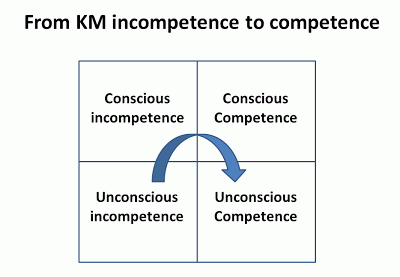The case of “Need to know” vs. "Need to protect" - How widely should we share information?
When discussing knowledge sharing and exchange of material and documents with professionals in charge of information classification policies and standards, the question is often what the "default mode" for an organization should be. Should unclassified information such as documents, articles etc, be treated as “for internal use only” or as “public” information?
I want to use this post to affirm my strong conviction that any international development organization has an overwhelming interest in making unclassified information by default public unless it is specifically designated as internal to a specified group of people only (a small group within an organization, or members of the organization as a whole). And here is why:
Being an actor in the knowledge business calls for an information policy that fosters the distribution of knowledge, not prevents it. The paradigm of “need to know” is right for an organization whose main concern is the preservation of what it has. But development organizations are not in the business of heritage preservation or patent protection. Our business is innovation for development results. Innovation, however, only happens in an environment that is open, transparent and conducive for vibrant interaction and exchange on all levels. We must understand that the development community will only be able to achieve the our common vision of development and make a tangible contribution to reaching the MDGs by changing the paradigm of “need to know” into a paradigm of “need to protect”.
This is understood by the World Bank Chief who, in a groundbreaking speech in September, announced a fundamental paradigm shift in the way the bank plans to deal with its previously internal information in the future. This initiative called “Open Data, Open Knowledge, Open Solutions” intends to “open the treasure chest of the World Bank’s data and knowledge to every village health care worker, every researcher, everyone”.
As part of the “push for greater accountability and openness”, on July 1, 2010, the World Bank launched a new Access to Information policy which “sets a new standard of disclosure for international organizations. This enhanced transparency and accountability will allow for [...] enabling better development results; making information more accessible to the general public; and providing an opportunity to better track the use of public funds” (see source attached).
Of course at this point this is still not much more than pledge yet, but even as such it is a signal that knowledge workers in development have been waiting for a long time. If we are looking for good practices and leadership regarding information policy in our partner organizations, it is this approach we have to look at.
Yes, we have an interest to protect our organizations from reputational harm and legal liabilities, and we have to do what is necessary to ensure this protection. But we have to carefully weigh this internal interest against the overarching interest to fulfil our mandate and serve our clients and partners. If our policies at the end of the day prevent us from doing our job as best we can, then something went wrong.
I want to use this post to affirm my strong conviction that any international development organization has an overwhelming interest in making unclassified information by default public unless it is specifically designated as internal to a specified group of people only (a small group within an organization, or members of the organization as a whole). And here is why:
Being an actor in the knowledge business calls for an information policy that fosters the distribution of knowledge, not prevents it. The paradigm of “need to know” is right for an organization whose main concern is the preservation of what it has. But development organizations are not in the business of heritage preservation or patent protection. Our business is innovation for development results. Innovation, however, only happens in an environment that is open, transparent and conducive for vibrant interaction and exchange on all levels. We must understand that the development community will only be able to achieve the our common vision of development and make a tangible contribution to reaching the MDGs by changing the paradigm of “need to know” into a paradigm of “need to protect”.
This is understood by the World Bank Chief who, in a groundbreaking speech in September, announced a fundamental paradigm shift in the way the bank plans to deal with its previously internal information in the future. This initiative called “Open Data, Open Knowledge, Open Solutions” intends to “open the treasure chest of the World Bank’s data and knowledge to every village health care worker, every researcher, everyone”.
As part of the “push for greater accountability and openness”, on July 1, 2010, the World Bank launched a new Access to Information policy which “sets a new standard of disclosure for international organizations. This enhanced transparency and accountability will allow for [...] enabling better development results; making information more accessible to the general public; and providing an opportunity to better track the use of public funds” (see source attached).
Of course at this point this is still not much more than pledge yet, but even as such it is a signal that knowledge workers in development have been waiting for a long time. If we are looking for good practices and leadership regarding information policy in our partner organizations, it is this approach we have to look at.
Yes, we have an interest to protect our organizations from reputational harm and legal liabilities, and we have to do what is necessary to ensure this protection. But we have to carefully weigh this internal interest against the overarching interest to fulfil our mandate and serve our clients and partners. If our policies at the end of the day prevent us from doing our job as best we can, then something went wrong.



Comments